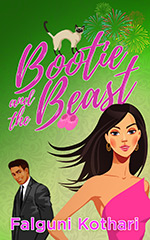Juliet:
"What's in a name? That which we call a rose By any other name would smell as sweet."
Romeo and Juliet (II, ii, 1-2)
That's true, Julie baby. Yet, imagine if you were called Imogen.
Romeo and Imogen. Or Gunther and Juliet... doesn't quite compliment, does it? Or is it that we're so used to R and J that anything else just sounds weird?
For the most part, a book's title, the names of its characters and it's writing should be cohesively married. A lot of authors refuse to write a single word before having wild christening parties for the book's title and character names. George R R Martin and...me :)
For both, It's Your Move, Wordfreak and Bootie and the Beast, I had title and names decided before I sat down to write. And, I suppose they were good and apt as neither of my publishers asked me to change them.
With my work in progress, LUHU, I started out similarly-had both title and character names down before I began writing.
Why? Because it gives me a start-off point and a go-to point when/if I get lost. For me, the title of my book is the broad theme of it.
In It's Your Move, Wordfreak, the character Wordfreak/Aryan had to make all the main moves: go after Wordiva, tell her the truth,forgive his father...
In Bootie and the Beast, a bootie triggers Sleeping Beauty to wake up and poke the Beast, And the Beast to tame his Beauty.
But something has happened in LUHU. Half through it, I am suddenly unsure of the title...though it is apt. Its just stopped fitting as it was in the beginning. And I am worried what that means.
That brought me to this post. I thought by writing about it, it might clear my head.
Can TITLE affect the flavor of a story? Do character names matter or is it simply the character that matters. Would Frankenstein inspire awe if it was named Casper?
BTW: great example of a misleading book title. Most people assume (those who've not read the classic and therefore SPOILER ALERT) that Frankenstein is the monster. Nope, Franky is the doctor who made the Monster.
Other examples of misleading titles:
To Kill a Mockingbird which has nothing to do with lessons in bird watching or hunting or even taxidermy but with a trial of an innocent black man and his white attorney.
Of Mice and Men you'd think was about a plague or science experiment about a cross-species of mice and men. Its actually about wandering migrant workers during the Great Depression.
Wow. Right?
But that just proves that titles don't have to match the prose. Then we have titles that match so well they've become engraved in history. And titles that are better than the story...
So, Dear Reader, how much do you think titles and names matter, in the end?










No comments:
Post a Comment